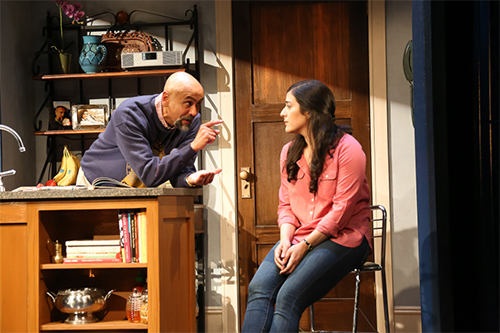Translate Page

---
Ayad Akhtar got the idea for his new play in the back of a taxi cab. An advertisement for Kiss Me Kate, Cole Porter's musical adaptation of <em>The Taming of the Shrew</em>, flashed on the backseat TV screen, and it got him thinking.
"I sort of wondered to myself, 'What is the obsession with The Taming of the Shrew that folks have?'" he recalls. "The gender politics in that play don't really speak to the contemporary gender politics at work in the culture."
But then he realized there is indeed a culture in which extremely conservative ideas about men and women still resonate: Islam. "I recognized an old world attitude toward gender politics, with a very clearly defined masculine, a very clearly defined feminine, and the dramatic conflict that inherently arises from that power struggle," Akhtar says.
Drawing from his Pakistani-American upbringing, he places this dramatic tension at the center of The Who and the What, a dark comedy directed by Kimberly Senior that's now playing in Lincoln Center Theater's LCT3 series.
For Akhtar, it's easy to connect the dots between his own background and Shakespeare's comedy of feminist mischief. "It's pretty common in Pakistani households, even in Pakistani-American households, to have an older sister expected to marry before the younger sister," he says, adding that as the eldest of six daughters in Pakistan, his mother felt intense pressure to get married. "I'm trying to reach some kind of universal place, but I have to go through the specifics of my own experience, my own culture. In a way, this play is an homage to my mom."
Like Disgraced, Akhtar's Pulitzer Prize-winning drama which also premiered in LCT3 (and will appear on Broadway this fall), The Who and the What seeks to embody the tensions and contradictions that are intrinsic to the modern Muslim-American experience. But as Zarina (Nadine Malouf), this story's "untamable shrew," declares in the play, the conversation is ultimately about gender politics. Meanwhile, her father Afzal (Bernard White) represents traditional, unwavering Islamic attitudes. He's the patriarch censoring his daughter's doubts about the Prophet Muhammad even as he smothers her with love.
The audience may feel torn between these two personified ideals, caught between feminist emancipation and religious conviction. "It's fine for the audience to walk away and be wrestling with their affections for Afzal or their affections for Zarina and where they sit with all of that," Akhtar says.
He also writes with a bifurcated audience in mind: Muslim patrons will no doubt experience parts of the story differently than non-Muslims. "The end of the first act, for a Western audience, doesn't strike anybody as particularly controversial," Akhtar says. "The end of that first act in a Muslim country could start riots and get them to burn the theatre down."
No matter who's seeing the show, Akhtar believes the theatre itself has the power to achieve transcendence, to "reach into us and make us feel more deeply and more fully than we can individually." If a play like The Who and the What transports us or uplifts us or puts us back in touch with our mythic roots, then what's the difference between an audience and a congregation?
"There's something about the process of communion or union together, which in its worst incarnation is exhibited by mob mentalities, but in its highest incarnation is exhibited by religious experience," Akhtar says. "And I think that the theatre is an open doorway for those who choose to practice it as such. There's a sense of the awe and reverence that I think all of us share, even when we're not religious denominationally. Theatre at its most profound really can be a religious space in society."
---
Jack Smart is a Brooklyn-based arts writer and critic. He blogs about theatre and pop culture at JackSmartReviews
Photos by Erin Baiano